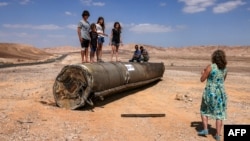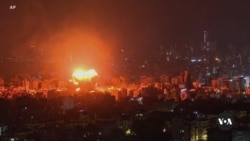
Israel’s vow to make Iran pay a price for carrying out a large-scale missile strike on the Jewish state has prompted panic buying of gasoline in major Iranian cities and a day-long suspension of commercial flights in Iranian airspace.
Iran fired about 200 ballistic missiles at Israel after nightfall on Tuesday, in a major escalation of a yearlong conflict between Israel and Iran’s regional proxy forces. The Israeli military intercepted most of the missiles with help from allied U.S. naval forces.
Speaking late Tuesday, Israeli Prime Minister Benjamin Netanyahu said Iran’s Islamist rulers had made a “big mistake” by attacking his nation. Other Israeli officials warned those rulers to expect a powerful and painful response.
Israel’s threats sparked long lines of cars outside gas stations in major Iranian cities as drivers rushed to fill their vehicles’ tanks.
One video posted to social media and vetted by VOA Persian showed dozens of cars waiting to fill up at a gas station in Tehran, apparently on Wednesday. Other social media clips reviewed by VOA Persian appeared to show similar long lines of vehicles outside gas stations late Tuesday in the Tehran provincial city of Eslamshahr and in the central city of Isfahan.
VOA could not independently confirm the panic buying at the gas stations seen in the videos because it is barred from operating inside Iran.
In another apparent reaction to Israel’s threat of a retaliatory strike, Iran shut its airspace to all domestic and international flights after completing its missile attack. The Iranian Civil Aviation Organization’s Aerospace Committee said in a Wednesday statement that flights would remain suspended until at least 5 a.m. local time on Thursday to “maintain the safety of passengers.”
Flight tracking website FlightAware showed domestic and international commercial flights resuming over Iranian airspace after dawn on Thursday.
Western media reported on Wednesday that Israel may target Iran’s oil and other energy facilities in its threatened retaliation. There was no confirmation from Israel.
Any Israeli strike on Iranian oil or gas infrastructure would have a big economic impact on the country, according to Kpler’s Homayoun Falakshahi, a senior oil analyst for the Belgium-based global trade data firm.
In a message to VOA, Falakshahi said Iran sources most of its gasoline from domestically produced oil that it refines into petroleum products.
Iran’s Islamist rulers also rely heavily on revenue from energy exports to major customers such as China, a practice they have maintained for years in defiance of U.S. sanctions. Tehran has shipped an average of 1.54 million barrels of crude oil and gas condensate per day for the year to date, according to Falakshahi.
Iran does not publish official data on its energy exports as part of its efforts to circumvent sanctions. Kpler uses a variety of sources to estimate those Iranian exports, such as location data from oil tankers' Automatic Identification System transponders, satellite imagery, and information provided by personnel at ports.
The impact of an Israeli attack on Iran's energy exports would depend on whether Israel targets export infrastructure, Falakshahi said. “For now, I don’t think such an attack will be the case, because China would get quite upset,” he added.
This story was produced in collaboration with VOA’s Persian Service.









